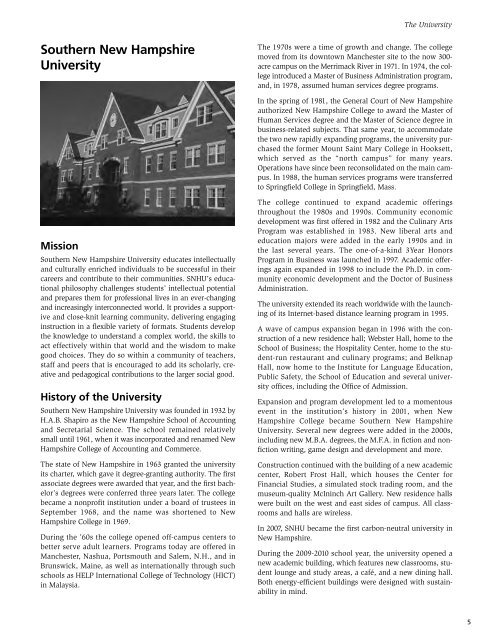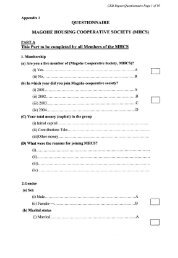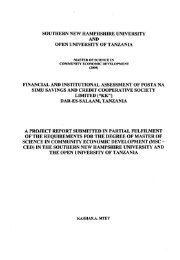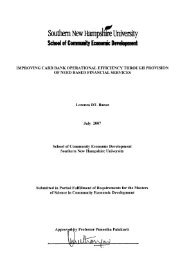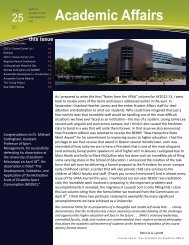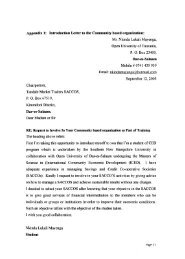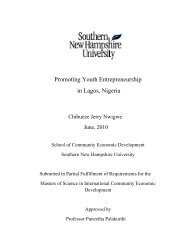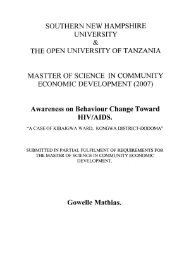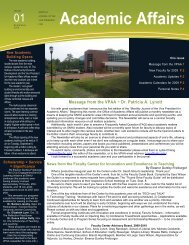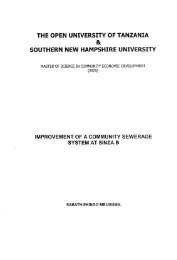Undergraduate Catalog 2010-2011 - SNHU Academic Archive ...
Undergraduate Catalog 2010-2011 - SNHU Academic Archive ...
Undergraduate Catalog 2010-2011 - SNHU Academic Archive ...
Create successful ePaper yourself
Turn your PDF publications into a flip-book with our unique Google optimized e-Paper software.
The University<br />
Southern New Hampshire<br />
University<br />
The 1970s were a time of growth and change. The college<br />
moved from its downtown Manchester site to the now 300-<br />
acre campus on the Merrimack River in 1971. In 1974, the college<br />
introduced a Master of Business Administration program,<br />
and, in 1978, assumed human services degree programs.<br />
In the spring of 1981, the General Court of New Hampshire<br />
authorized New Hampshire College to award the Master of<br />
Human Services degree and the Master of Science degree in<br />
business-related subjects. That same year, to accommodate<br />
the two new rapidly expanding programs, the university purchased<br />
the former Mount Saint Mary College in Hooksett,<br />
which served as the “north campus” for many years.<br />
Operations have since been reconsolidated on the main campus.<br />
In 1988, the human services programs were transferred<br />
to Springfield College in Springfield, Mass.<br />
Mission<br />
Southern New Hampshire University educates intellectually<br />
and culturally enriched individuals to be successful in their<br />
careers and contribute to their communities. <strong>SNHU</strong>’s educational<br />
philosophy challenges students’ intellectual potential<br />
and prepares them for professional lives in an ever-changing<br />
and increasingly interconnected world. It provides a supportive<br />
and close-knit learning community, delivering engaging<br />
instruction in a flexible variety of formats. Students develop<br />
the knowledge to understand a complex world, the skills to<br />
act effectively within that world and the wisdom to make<br />
good choices. They do so within a community of teachers,<br />
staff and peers that is encouraged to add its scholarly, creative<br />
and pedagogical contributions to the larger social good.<br />
History of the University<br />
Southern New Hampshire University was founded in 1932 by<br />
H.A.B. Shapiro as the New Hampshire School of Accounting<br />
and Secretarial Science. The school remained relatively<br />
small until 1961, when it was incorporated and renamed New<br />
Hampshire College of Accounting and Commerce.<br />
The state of New Hampshire in 1963 granted the university<br />
its charter, which gave it degree-granting authority. The first<br />
associate degrees were awarded that year, and the first bachelor’s<br />
degrees were conferred three years later. The college<br />
became a nonprofit institution under a board of trustees in<br />
September 1968, and the name was shortened to New<br />
Hampshire College in 1969.<br />
During the ’60s the college opened off-campus centers to<br />
better serve adult learners. Programs today are offered in<br />
Manchester, Nashua, Portsmouth and Salem, N.H., and in<br />
Brunswick, Maine, as well as internationally through such<br />
schools as HELP International College of Technology (HICT)<br />
in Malaysia.<br />
The college continued to expand academic offerings<br />
throughout the 1980s and 1990s. Community economic<br />
development was first offered in 1982 and the Culinary Arts<br />
Program was established in 1983. New liberal arts and<br />
education majors were added in the early 1990s and in<br />
the last several years. The one-of-a-kind 3Year Honors<br />
Program in Business was launched in 1997. <strong>Academic</strong> offerings<br />
again expanded in 1998 to include the Ph.D. in community<br />
economic development and the Doctor of Business<br />
Administration.<br />
The university extended its reach worldwide with the launching<br />
of its Internet-based distance learning program in 1995.<br />
A wave of campus expansion began in 1996 with the construction<br />
of a new residence hall; Webster Hall, home to the<br />
School of Business; the Hospitality Center, home to the student-run<br />
restaurant and culinary programs; and Belknap<br />
Hall, now home to the Institute for Language Education,<br />
Public Safety, the School of Education and several university<br />
offices, including the Office of Admission.<br />
Expansion and program development led to a momentous<br />
event in the institution’s history in 2001, when New<br />
Hampshire College became Southern New Hampshire<br />
University. Several new degrees were added in the 2000s,<br />
including new M.B.A. degrees, the M.F.A. in fiction and nonfiction<br />
writing, game design and development and more.<br />
Construction continued with the building of a new academic<br />
center, Robert Frost Hall, which houses the Center for<br />
Financial Studies, a simulated stock trading room, and the<br />
museum-quality McIninch Art Gallery. New residence halls<br />
were built on the west and east sides of campus. All classrooms<br />
and halls are wireless.<br />
In 2007, <strong>SNHU</strong> became the first carbon-neutral university in<br />
New Hampshire.<br />
During the 2009-<strong>2010</strong> school year, the university opened a<br />
new academic building, which features new classrooms, student<br />
lounge and study areas, a café, and a new dining hall.<br />
Both energy-efficient buildings were designed with sustainability<br />
in mind.<br />
5


